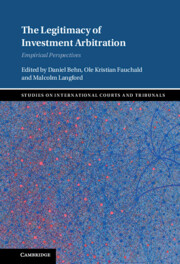Book contents
- The Legitimacy of Investment Arbitration
- Studies on International Courts and Tribunals
- The Legitimacy of Investment Arbitration
- Copyright page
- Contents
- Figures
- Tables
- Contributors
- 1 Introduction: The Legitimacy Crisis and the Empirical Turn
- 2 The International Investment Regime and Its Discontents
- Part I Process Legitimacy
- Part II Process Legitimacy
- Part III Output Legitimacy
- Part IV Legitimation Strategies
- 15 Does International Arbitration Enfeeble or Enhance Local Legal Institutions?
- 16 Learning from Investment Treaty Law and Arbitration: Developing States and Power Inequalities
- 17 Legitimation through Modification: Do States Seek More Regulatory Space in Their Investment Agreements?
- Index
16 - Learning from Investment Treaty Law and Arbitration: Developing States and Power Inequalities
from Part IV - Legitimation Strategies
Published online by Cambridge University Press: 06 January 2022
- The Legitimacy of Investment Arbitration
- Studies on International Courts and Tribunals
- The Legitimacy of Investment Arbitration
- Copyright page
- Contents
- Figures
- Tables
- Contributors
- 1 Introduction: The Legitimacy Crisis and the Empirical Turn
- 2 The International Investment Regime and Its Discontents
- Part I Process Legitimacy
- Part II Process Legitimacy
- Part III Output Legitimacy
- Part IV Legitimation Strategies
- 15 Does International Arbitration Enfeeble or Enhance Local Legal Institutions?
- 16 Learning from Investment Treaty Law and Arbitration: Developing States and Power Inequalities
- 17 Legitimation through Modification: Do States Seek More Regulatory Space in Their Investment Agreements?
- Index
Summary
The interaction of developing states with investment treaty law and arbitration constitutes an important part of the ongoing debate about the legitimacy of the investment treaty regime. However, the authors contend that the concern is often sidelined and that developing states and their concerns are frequently lumped together under the broader rubric of investment treaty law as a threat to national sovereignty and a constraint on regulatory autonomy. By focusing on the formal equality between contracting state parties and the reciprocal nature of international investment agreements (IIAs), the chapter contends that such narratives tend to mask the presence of power disparities, which considerably shape the involvement of developing states in the creation, diffusion and internalization of investment treaty law. The authors seek to counter these narratives by drawing on new empirical data to expose a range of structural, normative and institutional power inequalities. By using the optics of power and focusing on how developing states learn from and internalize investment treaty law, the chapter peers behind the formal structures of investment treaties and ISDS to identify the underlying processes and actors and to question the legitimacy of the prevailing norms and institutional arrangements.
Keywords
- Type
- Chapter
- Information
- The Legitimacy of Investment ArbitrationEmpirical Perspectives, pp. 501 - 530Publisher: Cambridge University PressPrint publication year: 2022

